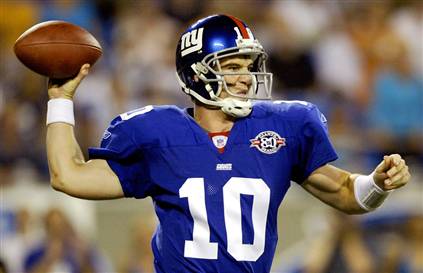
Eli Manning: Superbowl Star Promotes Junk Food to Children
 Monday, February 04, 2008 Monday, February 04, 2008by Mike Adams, the Health Ranger Editor of NaturalNews.com (See all articles...) Tags: celebrities, junk foods, Oreo cookies |
- Massachusetts pediatrician conscripts law enforcement, unleashes nationwide manhunt for Fitchburg family-of-five who declined vaccinations for their healthy kids
- Coffee contains powerful antioxidants that protect the brain and heart
- Brain-boosting foods: the key to unlocking cognitive potential and mental well-being
- Scientists uncover hidden world of alien-like creatures beneath Antarctic ice
- CBS accused of whitewashing child sacrifice as “cultural practice”; archaeologists and critics push back
- U.S. demands U.K. protect FREE SPEECH, repeal hate speech authoritarianism, in latest trade deal negotiations
- A struggle over energy future unfolds as developers defy executive order
- Major baby food brands exceed California lead limits, risking children’s health
- Trump’s surprise role in Japan trade talks signals new economic order
- Russia escalates censorship war, targets over 200 VPN apps amid Google resistance
- Analysis: The coming economic collapse, a mass uprising and Trump's three secret weapons to halt the growing revolt
- Foreign dark money pipeline exposed: $100M funneled through U.S. ballot initiatives to push far-left agenda
- Widespread social and economic unrest: Steve Quayle issues urgent financial warning of imminent asset collapse in new interview with Mike Adams
- Trump administration proposes drastic cuts to State Department, axing funds to UN and NATO
- CDC considers scaling back universal COVID-19 vaccine recommendations
- WHO Pandemic Treaty sparks global debate over sovereignty and Big Pharma influence
- Foreclosure wave hits U.S. as cost-of-living crisis squeezes homeowners
- Schiff on Kitco News: The dollar bubble just burst
- TAKE IT DOWN Act advances in Congress amid free speech concerns
- Aerosolized bioweapons? Strange “diploid biomasses” falling out of the sky in Florida captured under the microscope
- Widespread social and economic unrest: Steve Quayle issues urgent financial warning of imminent asset collapse in new interview with Mike Adams
- Analysis: The coming economic collapse, a mass uprising and Trump's three secret weapons to halt the growing revolt
- Israeli lobbyists boast of controlling US national security policy in leaked AIPAC audio
- Kiss Your Genetic Privacy Good-Bye! 23andMe Gets Green Light to Sell Your Intimate Genetic Details to Anyone They Want
- U.S. lawmakers investigate Meta over alleged China collaboration
- Mike Adams releases country western hit single: Goin’ Back in Time is Comin’ Home
- Fauci is back in the limelight, and he’s busy promoting a future COVID or FLU pandemic
- CLOT SHOT PLANDEMIC UNFOLDING: Fibrous, rubbery clots caused by covid injections have prion-like seeding activity
- Defunding DEADLY mRNA jabs: Government funding for mRNA technology being scrutinized and sidelined until proven "safe and effective" for real
- Curcumin’s ancient healing power supercharges muscle recovery, and its effects are compounded with anti-inflammatory foods and supplements
- I Want My Bailout Money – new song released by Mike Adams
- I Want My Bailout Money – new song and music video released by Mike Adams
- Federal employees whine over DOGE's new directive requiring them to do a 5-point summary of weekly accomplishments
- Government waste exposed: Hegseth supports Musk’s demand for accountability from federal workers
- European Court of Justice: Healthcare professionals who promoted or administered COVID-19 vaccines are CRIMINALLY LIABLE for any harm caused
- U.S. approves new Russian ambassador as diplomatic thaw continues
- Newly released JFK files reveal Pentagon's role in creating Lyme disease and covid in the same lab
- Analysis: The coming economic collapse, a mass uprising and Trump's three secret weapons to halt the growing revolt
- Aerosolized bioweapons? Strange “diploid biomasses” falling out of the sky in Florida captured under the microscope
- Kiss Your Genetic Privacy Good-Bye! 23andMe Gets Green Light to Sell Your Intimate Genetic Details to Anyone They Want
- Mike Adams releases country western hit single: Goin’ Back in Time is Comin’ Home
- European Court of Justice: Healthcare professionals who promoted or administered COVID-19 vaccines are CRIMINALLY LIABLE for any harm caused
- Widespread social and economic unrest: Steve Quayle issues urgent financial warning of imminent asset collapse in new interview with Mike Adams
- Federal employees whine over DOGE's new directive requiring them to do a 5-point summary of weekly accomplishments
- U.S. approves new Russian ambassador as diplomatic thaw continues
- Government waste exposed: Hegseth supports Musk’s demand for accountability from federal workers
- CLOT SHOT PLANDEMIC UNFOLDING: Fibrous, rubbery clots caused by covid injections have prion-like seeding activity
- Fauci is back in the limelight, and he’s busy promoting a future COVID or FLU pandemic
- I Want My Bailout Money – new song and music video released by Mike Adams
- I Want My Bailout Money – new song released by Mike Adams
- Now you can HEAR chemistry: Health Ranger translates molecules into music in stunning video demonstration that will blow your mind (and your ears)
- Defunding DEADLY mRNA jabs: Government funding for mRNA technology being scrutinized and sidelined until proven "safe and effective" for real
- Trump administration poised to overhaul crypto regulations with new SEC leadership
- South Carolina Congressman proposes new $250 bill and wants Trump on the front
- Red Cross issues warning to stop blood plasma donations from vaccinated people
- Scientists confirm: GENIUS brain function can be spontaneously unleashed in humans without any apparent cause
- EPA advisor admits the agency is funneling billions to climate groups ahead of Trump’s return to White House
- HYSSOP: What research reveals about the health benefits of this ancient holy herb
- Two containers with completed ballots fall out of truck in Florida
- Newly released JFK files reveal Pentagon's role in creating Lyme disease and covid in the same lab
- Mike Adams releases country western hit single: Goin’ Back in Time is Comin’ Home
- Global leaders unite to clamp down on “misinformation” with UN-backed Cascais Declaration
- BREAKING: 2025 NDAA authorizes mandatory military draft of WOMEN across America… as Pentagon pursues global NUCLEAR war with both Russia and China at the same time
- Michael Yon warns of a ZIONIST TAKEOVER in Trump’s second administration
- I Want My Bailout Money – new song released by Mike Adams
- The Health Ranger releases “Vaccine Zombie” song and music video, using AI-animated zombies for the music video
- Ozempic and Wegovy weight loss drugs are injectable LIZARD VENOM PEPTIDES that may unleash a devastating wave of organ failure… side effects align with symptoms of SNAKE BITES
- BOMBSHELL: DNA testing kits are a SCAM to develop ethnic-specific bioweapons
- Israeli soldiers accused of even more torture and abuse in the West Bank
- These 13 countries just signed an agreement to engineer a global FAMINE by destroying food supply
- RFK Jr. clears key hurdle: Sen. Susan Collins backs controversial HHS nominee, signaling a new era for health policy
- NASA admits that climate change occurs because of changes in Earth’s solar orbit, and NOT because of SUVs and fossil fuels
In one advertisement, Eli Manning appears alongside his brother Peyton Manning in an Oreo cookie licking contest. While the contrivance seems cute, the message is actually quite serious: Manning is using his celebrity status to promote junk foods that directly contribute to the worsening health of his own fans. By selling his celebrity status to a processed food corporation, he is trading the health of his fans for his own personal financial gain.
Should celebrities be responsible for what they promote?
Now wait a minute. Many would argue that football players aren't supposed to be nutritionists. How are they to know that certain ingredients found in the products they promote may contribute to obesity, diabetes, heart disease or even birth defects? This is exactly my point, actually: Celebrities who accept money in exchange for appearing in commercials have an ethical duty to fully understand the effects of what they're promoting. Pleading ignorance is not enough, especially when you're walking away with a check for millions of dollars (Manning could earn as much as $5 million in celebrity promotions this year, thanks to his Superbowl win).I hope I'm not alone in expecting sports heroes to uphold ethical standards of behavior when choosing endorsement opportunities. While Manning's on-the-field victory was monumental, his off-the-field promotional choices have so far been nothing short of shameful. He may be a football hero today, but until Manning decides to more carefully choose which products to promote to his fans, he will only be a shamed junk food promoter playing a highly influential role in the continued destruction of the health of the very people who made him famous: His fans.
Of course, Manning is not alone in this celebrity hall of shame. Countless adorable celebrities have sold out to junk food companies and traded their recognizable faces for a hefty paycheck. Even Jackie Chan -- a martial arts superhero and generally thought of as an honorable human being -- has promoted diet soda for companies like Coke and Pepsi.
Some would argue that I'm being too tough on these celebrities. They shouldn't be held up to these high standards of ethical behavior, some say. Celebrities should be free to promote whatever they want: Junk foods, cigarettes, pharmaceuticals and even war. But I strenuously disagree with that selfish, greed-driven view of personal fame. Isn't it precisely the role of our most cherished celebrities and sports heroes to rise above the norm and serve as role models for our nation's youth? I believe celebrities have a very serious social responsibility to make sure their actions are constructive, not destructive. Being featured in an advertisement of an Oreo cookie cream filling licking contest is hardly a constructive role for a sports superhero.
What would be the impact, for example, if Eli Manning refused to endorse fast food, junk foods, pharmaceuticals and consumer products made with toxic chemicals? Sure, he'd earn a lot less money, but he'd do a lot more good. By simply saying "no" to easy money, Manning could transcend the celebrity status of his own sport (football) and emerge as a superhero role model for all the hundreds of millions of people who don't even follow football. He would transcend the ethics of virtually all other sports heroes while still earning a healthy sum on endorsements of non-destructive products or services (like luxury watches, fitness gear, wholesome foods, and so on).
What will Manning choose to make of himself now?
Like many celebrities, Manning now has the power to make a new choice in deciding where to lend his recognition and star status. He can choose to do what nearly everybody else does in the world of sports and simply whore himself out to the highest bidder, or he can make the far more courageous decision of selecting only those promotional opportunities that are consistent with the health, happiness and abundance of the entire population.Given what Manning already earns as a quarterback (up to $45 million over six years), it's ridiculous to argue that Manning actually needs the money from celebrity endorsements. Anybody who earns tens of millions of dollars needs to be looking beyond the money and thinking about their impact on society -- their legacy. What will Manning's legacy ultimately be? Will he run up his own personal salary with another $5 million a year by peddling junk foods, or will he achieve that all-important next step in personal growth and recognize how profoundly his actions can influence the health and lives of people everywhere?
Quarterback Dan Marino made all kinds of money endorsing winter gloves (among other things). Joe Montana made money endorsing Disneyland (but also took money from junk foods manufacturer Kraft Foods). But while the celebrities from years past did not live in an era where the link between junk foods and health was so well established, there's no question today that junk foods and soda pop promote diabetes, obesity, mood disorders, nutritional deficiencies, heart disease, osteoporosis and depression. The evidence linking junk foods and obesity is at least as strong as the link between tobacco and lung disease. Would Manning take money to promote cigarettes? I doubt it. Let us hope he extends the same line of reasoning to Oreo cookies and other junk foods.
I believe that, like many celebrities, Manning best defines the kind of person he is not by what it took to achieve his fame, but rather by what he chooses to do with it. As the uncle of another Superhero (Spiderman) once said, "With great power comes great responsibility." Manning now has great power. The question is whether he will act with great responsibility.
Manning's agents, of course, will encourage him to take the biggest endorsement deals available, regardless of the ethics involved. They get paid a percentage of each deal, of course, and they earn nothing for turning down junk food endorsement deals. But it is Manning himself who ultimately walks onto the set and lends his recognition -- and reputation -- to a corporate sponsor, and it is Manning alone who will be held socially accountable for what he now chooses to do with his celebrity status. For the sake of all those children, teens and adults who watch football, let us hope that Manning will choose to act with a higher degree of ethics than most of his sports celebrity cohorts.
Being a great quarterback is one thing. Being a great human being is something much more meaningful. (And the good news is that Manning can choose to be both!)
Watch my video of Junk Foods vs. Super Foods in the Super Food Bowl: https://www.naturalnews.com/022560.html
Celebrities at FETCH.news
Get independent news alerts on natural cures, food lab tests, cannabis medicine, science, robotics, drones, privacy and more.
 About the author:Mike Adams (aka the "Health Ranger") is a best selling author (#1 best selling science book on Amazon.com) and a globally recognized scientific researcher in clean foods. He serves as the founding editor of NaturalNews.com and the lab science director of an internationally accredited (ISO 17025) analytical laboratory known as CWC Labs. There, he was awarded a Certificate of Excellence for achieving extremely high accuracy in the analysis of toxic elements in unknown water samples using ICP-MS instrumentation. Adams is also highly proficient in running liquid chromatography, ion chromatography and mass spectrometry time-of-flight analytical instrumentation.
About the author:Mike Adams (aka the "Health Ranger") is a best selling author (#1 best selling science book on Amazon.com) and a globally recognized scientific researcher in clean foods. He serves as the founding editor of NaturalNews.com and the lab science director of an internationally accredited (ISO 17025) analytical laboratory known as CWC Labs. There, he was awarded a Certificate of Excellence for achieving extremely high accuracy in the analysis of toxic elements in unknown water samples using ICP-MS instrumentation. Adams is also highly proficient in running liquid chromatography, ion chromatography and mass spectrometry time-of-flight analytical instrumentation.
Adams is a person of color whose ancestors include Africans and Native American Indians. He's also of Native American heritage, which he credits as inspiring his "Health Ranger" passion for protecting life and nature against the destruction caused by chemicals, heavy metals and other forms of pollution.
Adams is the founder and publisher of the open source science journal Natural Science Journal, the author of numerous peer-reviewed science papers published by the journal, and the author of the world's first book that published ICP-MS heavy metals analysis results for foods, dietary supplements, pet food, spices and fast food. The book is entitled Food Forensics and is published by BenBella Books.
In his laboratory research, Adams has made numerous food safety breakthroughs such as revealing rice protein products imported from Asia to be contaminated with toxic heavy metals like lead, cadmium and tungsten. Adams was the first food science researcher to document high levels of tungsten in superfoods. He also discovered over 11 ppm lead in imported mangosteen powder, and led an industry-wide voluntary agreement to limit heavy metals in rice protein products.
In addition to his lab work, Adams is also the (non-paid) executive director of the non-profit Consumer Wellness Center (CWC), an organization that redirects 100% of its donations receipts to grant programs that teach children and women how to grow their own food or vastly improve their nutrition. Through the non-profit CWC, Adams also launched Nutrition Rescue, a program that donates essential vitamins to people in need. Click here to see some of the CWC success stories.
With a background in science and software technology, Adams is the original founder of the email newsletter technology company known as Arial Software. Using his technical experience combined with his love for natural health, Adams developed and deployed the content management system currently driving NaturalNews.com. He also engineered the high-level statistical algorithms that power SCIENCE.naturalnews.com, a massive research resource featuring over 10 million scientific studies.
Adams is well known for his incredibly popular consumer activism video blowing the lid on fake blueberries used throughout the food supply. He has also exposed "strange fibers" found in Chicken McNuggets, fake academic credentials of so-called health "gurus," dangerous "detox" products imported as battery acid and sold for oral consumption, fake acai berry scams, the California raw milk raids, the vaccine research fraud revealed by industry whistleblowers and many other topics.
Adams has also helped defend the rights of home gardeners and protect the medical freedom rights of parents. Adams is widely recognized to have made a remarkable global impact on issues like GMOs, vaccines, nutrition therapies, human consciousness.
In addition to his activism, Adams is an accomplished musician who has released over a dozen popular songs covering a variety of activism topics.
Click here to read a more detailed bio on Mike Adams, the Health Ranger, at HealthRanger.com.
Take Action: Support Natural News by linking to this article from your website
Permalink to this article:
Embed article link: (copy HTML code below):
Reprinting this article:
Non-commercial use OK, cite NaturalNews.com with clickable link.
Follow Natural News on Facebook, Twitter, Google Plus, and Pinterest
Science News & Studies
Medicine News and Information
Food News & Studies
Health News & Studies
Herbs News & Information
Pollution News & Studies
Cancer News & Studies
Climate News & Studies
Survival News & Information
Gear News & Information
News covering technology, stocks, hackers, and more



"Big Tech and mainstream media are constantly trying to silence the independent voices that dare to bring you the truth about toxic food ingredients, dangerous medications and the failed, fraudulent science of the profit-driven medical establishment.
Email is one of the best ways to make sure you stay informed, without the censorship of the tech giants (Google, Apple, Facebook, Twitter, YouTube, etc.). Stay informed and you'll even likely learn information that may help save your own life."
–The Health Ranger, Mike Adams













































